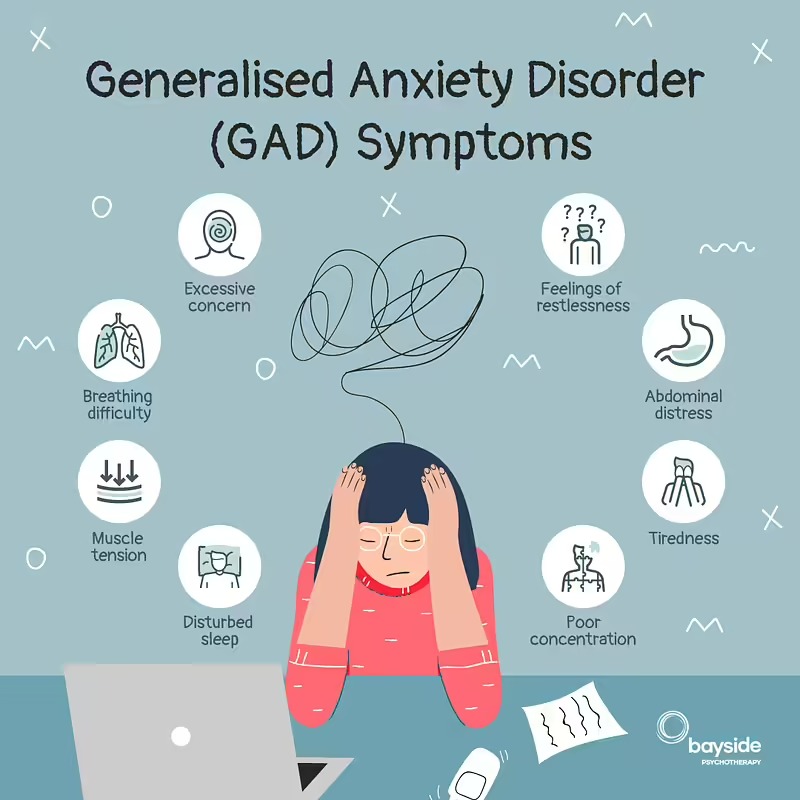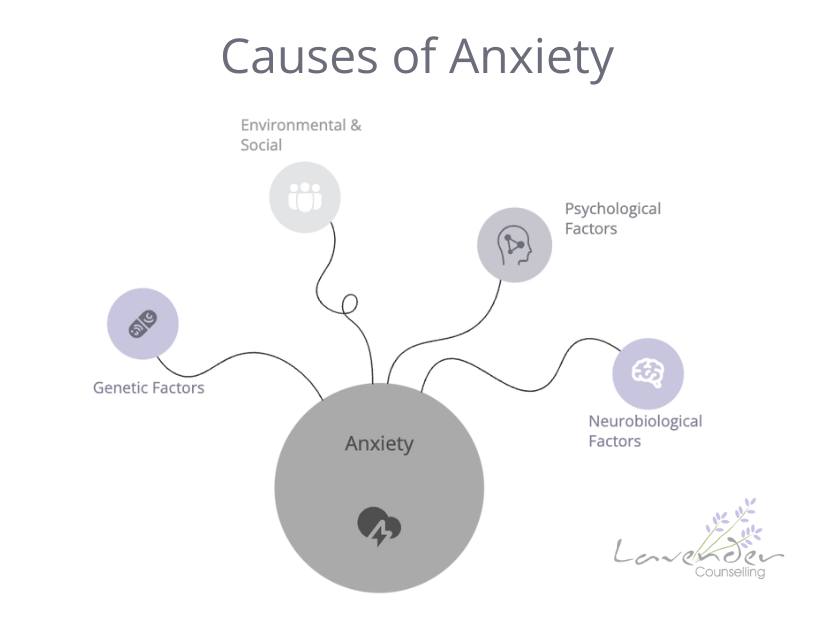Exploring Various Strategies in Counselling for Stress And Anxiety Problem for Enduring Change
When tackling anxiety problems, it's vital to explore a selection of counseling methods. Each method offers one-of-a-kind understandings and devices to assist you handle your signs and symptoms successfully. You could find that combining methods can generate the most effective results. However, comprehending the nuances of these methods is essential to cultivating lasting modification. What happens if the right combination could release a brand-new level of psychological well-being for you?
Understanding Anxiousness Conditions: A Quick Introduction
Anxiousness problems, which affect numerous individuals worldwide, can considerably affect every day life. You might experience overwhelming sensations of concern or fret that seem uncontrollable. These feelings can bring about physical signs like a racing heart, sweating, and even wooziness. Typical kinds of anxiety problems include generalized anxiousness problem, panic attack, and social anxiety problem. Each has special indications, but they all share a propensity to interrupt your routine and relationships.Understanding the source of your anxiousness is vital. It might stem from genetics, brain chemistry, or life experiences. Identifying your triggers can aid you handle your actions better. It is necessary to bear in mind that you're not the only one in this struggle. Many individuals face similar difficulties, and looking for help is a solid action toward sensation better. By learning more about anxiety disorders, you're already on the path to understanding and managing your problem better.
Cognitive-Behavioral Treatment: Challenging Negative Thought Patterns
In Cognitive-Behavioral Therapy, you'll start by recognizing the negative thought sets off that add to your anxiety. When you identify these thoughts, you'll work with changing them with even more favorable options. Together, you'll develop effective coping methods to aid handle your anxiousness in daily circumstances.
Identifying Adverse Idea Triggers

When you experience moments of distress, recognizing the details triggers behind your adverse thoughts can be crucial in managing anxiousness. Beginning by taking note of circumstances that prompt sensations of worry or anxiety. Is it a congested space, an approaching due date, or a conversation with specific individuals? Write down these instances in a journal. This will aid you recognize patterns in your reasoning. Notification physical feelings that accompany your unfavorable ideas, like a racing heart or tightness in your upper body. By pinpointing these triggers, you gain understanding into what's sustaining your anxiousness. Recognizing these connections is the very first step in testing those ideas and inevitably gaining back control over your psychological reactions.
Replacing Ideas With Positives
Testing negative idea patterns is a vital action in transforming your state of mind and reducing anxiety. You may often find on your own entraped in cycles of insecurity or tragic reasoning. Rather than allowing these thoughts determine your sensations, practice changing them with positive affirmations or reasonable choices. When you think, "I can't handle this," change it to, "I can handle challenges one action at a time." This basic change can considerably influence your emotion. Regularly recognizing and countering these unfavorable thoughts assists produce a much healthier internal dialogue. Bear in mind, it requires time and effort, however constantly exercising this method can cause long lasting change, empowering you to deal with anxiousness with restored self-confidence and resilience.
Building Coping Strategies Together
Replacing unfavorable ideas is just the start of taking care of anxiety effectively. To create long lasting modification, you need to develop coping approaches that encourage you. Cognitive-Behavioral Treatment (CBT) assists you recognize and challenge those unhelpful thought patterns. Together, you and your therapist can discover just how these ideas effect your feelings and behaviors.Start by developing practical techniques, like journaling or mindfulness workouts, that permit you to face stress and anxiety head-on. When you face your worries gradually, you'll learn to respond in a different way.

Mindfulness and Acceptance-Based Approaches: Cultivating Present-Moment Recognition
As you browse the complexities of anxiousness, including mindfulness and acceptance-based strategies can significantly enhance your capability to cultivate present-moment understanding. By concentrating on the present moment, you'll discover that you can observe your ideas and feelings without judgment (Counseling services for anxiety). This technique helps you recognize your stress and anxiety without feeling overwhelmed by it.Engaging in mindfulness workouts, such as deep breathing, body scans, or directed reflections, enables you to ground yourself in your present experience. Acceptance-based strategies urge you to accept your emotions as opposed to fight versus them. They shed their power over you.Incorporating these methods right into your day-to-day regimen can change how you respond to anxiety when you approve your feelings. You'll develop resilience and find out to browse stressful circumstances with greater ease. Eventually, growing present-moment recognition lays the foundation for long lasting change, empowering you to lead a more satisfying life
Exposure Treatment: Challenging Worries Progressively
Direct exposure treatment aids you confront your fears in a gradual method, making it less overwhelming. You'll discover methods to deal with anxiety-provoking scenarios action by action, while additionally constructing coping strategies to manage your reactions. This method equips you to take control and minimize stress and anxiety over time.
Gradual Exposure Techniques

When encountering stress and anxiety, gradually facing your concerns can be an effective way to regain control. This strategy, known as gradual exposure, involves gradually subjecting yourself to the scenarios or items that trigger your anxiousness. Start with less challenging circumstances and slowly function your method up to even more challenging ones. For circumstances, if you hesitate of public talking, you might begin by talking in front of a mirror, then progress to sharing thoughts with a friend, and ultimately address a little group. Each action assists desensitize you to the anxiety, building your confidence with time. Remember, it's important to pace yourself and celebrate little triumphes as you move via this process, strengthening your capacity to take care of anxiety properly.
Structure Coping Methods
Building efficient coping methods is necessary for handling stress and anxiety, especially as you face your worries progressively - Counseling services for anxiety. One powerful technique is exposure therapy, where you start by encountering your fears in a controlled way. Begin with much less frightening scenarios and gradually function your way up to more tough circumstances. This gradual exposure assists desensitize you to stress and anxiety activates, making them much less overwhelming.Incorporate leisure techniques, such as deep breathing or mindfulness, to soothe your mind during exposure. Track your development, celebrating small success in the process to improve your self-confidence. Keep in mind, it's alright to take your time; the goal isn't perfection but steady improvement. By constructing these approaches, you'll empower on your own to browse stress and anxiety and accept life more fully
Psychodynamic Treatment: Revealing Root Causes of Stress And Anxiety
Psychodynamic treatment discovers the unconscious mind, exposing the source of your anxiousness. By analyzing your thoughts, sensations, and previous experiences, this method assists you discover underlying conflicts and unsolved problems that may contribute to your existing anxiousness. You'll collaborate with a therapist to explore youth experiences, connections, and emotional patterns that form your feedbacks today.As you get insight right into these deeper layers of your psyche, you'll begin to recognize just how past occasions affect your present actions. This understanding can bring about catharsis, enabling you to refine emotions you could have suppressed.Through the restorative relationship, you can likewise identify protection mechanisms that might have developed gradually, providing a more clear path to alter. Inevitably, psychodynamic therapy outfits you with the tools to address your anxiety at its core, promoting long-term change in your psychological well-being.
Integrative and All Natural Techniques: Incorporating Techniques for Greater Efficiency
Incorporating various restorative strategies can enhance your journey towards managing stress and anxiety better. By incorporating elements from cognitive-behavioral treatment, mindfulness methods, and holistic techniques, you can create a tailored technique that resolves your special demands. You may make use of cognitive-behavioral strategies to test adverse idea patterns while integrating mindfulness exercises to ground on your own in the present moment.Additionally, exploring alternative techniques such as yoga exercise or meditation can promote leisure and lower stress and anxiety signs. This mix permits you to create better self-awareness and resilience.Experimenting with these diverse methods can help you find what reverberates most with you. Keep in mind, it's about finding a harmony that functions, instead of adhering to a solitary technique. This integrative technique not only offers immediate alleviation yet likewise fosters long-lasting skills for handling anxiousness, encouraging you to redeem control over your life.
The Function of Assistance Equipments: Structure Strength Via Link
While it could appear that taking care of stress and anxiety is a singular journey, having a strong assistance system can play an essential role in your resilience. Surrounding on your own with compassionate close friends, family members, or assistance groups creates a secure room where you can honestly share your experiences and feelings. You advise yourself that you're not alone in this struggle.These connections provide motivation and can provide practical coping strategies that have actually worked for others when you connect with others. It's also an opportunity to get point of view; pals can help you see situations in different ways, minimizing feelings of isolation.Moreover, psychological assistance promotes a sense of belonging, which can significantly minimize anxiety symptoms. By leaning on your support group, you can build strength and take on challenges a lot more efficiently. Keep in mind, connecting for help signifies toughness, and it can make all the difference in your journey towards managing stress and anxiety.
Regularly Asked Questions
What Are the Typical Symptoms of Anxiety Conditions?
You might experience uneasyness, fatigue, problem concentrating, impatience, muscle stress, and sleep disturbances. Physical signs and symptoms can consist of fast heart beat, sweating, and trembling. Recognizing these signs early can assist you seek suitable support and treatment.
How Much Time Does Treatment Typically Last for Stress And Anxiety Conditions?
Therapy for anxiousness disorders commonly lasts anywhere from a few weeks to numerous months. It truly depends on your individual demands, development, and the techniques your therapist makes use of to aid you manage your anxiety efficiently.
Can Medicine Be Utilized Together With Treatment for Stress and anxiety?
Yes, medicine can definitely be used read more alongside treatment for anxiety. Incorporating both approaches often enhances treatment effectiveness, helping you manage symptoms while checking out underlying concerns via counseling (Counseling services for anxiety). Always consult your healthcare company for individualized guidance
Are There Self-Help Techniques for Handling Anxiousness?
Yes, there are several self-help strategies for managing stress and anxiety. You can exercise mindfulness, engage in normal workout, maintain a well balanced diet plan, establish a regular, and utilize deep breathing strategies to help in reducing anxiety signs and symptoms successfully.
Exactly how Do I Know if I Required Expert Help for Anxiousness?
